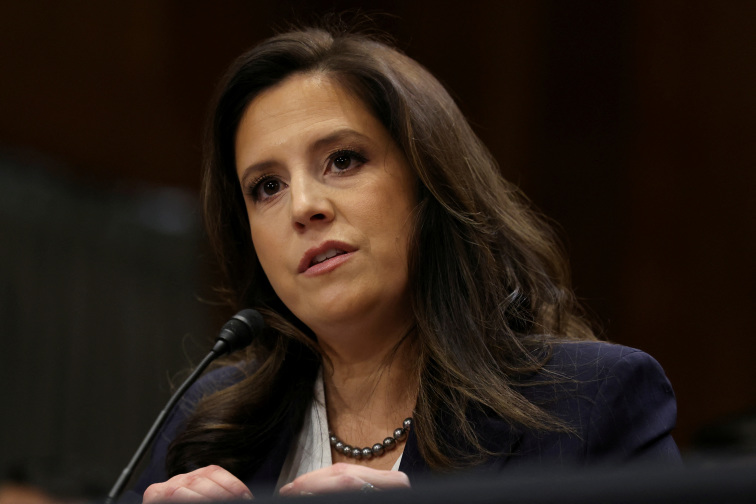Fan Bingbing's post was deleted three times. (Screenshot from Weibo)
[People News] Just as the storm ignited by Japanese Prime Minister Fumio Kishida's comments regarding 'Taiwan's situation' and the Chinese Consul General in Osaka, Xue Jian's 'decapitation theory' has plunged Sino-Japanese relations into a deep freeze, on November 22, Chinese actress Fan Bingbing won the Best Actress award at the Golden Horse Awards for her film 'Earth Mother,' which has sparked yet another wave of controversy in mainland China.
The 62nd Golden Horse Awards concluded on the 22nd, with Fan Bingbing successfully winning the Best Actress award for her new film 'Earth Mother,' directed by Malaysian filmmaker Zhang Jiajian.
In 'Earth Mother,' Fan Bingbing took on a groundbreaking role she had never attempted before, portraying a Malaysian farmer and shaman. She completely transformed her usual glamorous appearance, appearing without makeup throughout the film, gaining weight, wearing a prosthetic nose, labouring in the fields, and getting her skin tanned. She performed in multiple languages, delivering a powerful performance that showcased her ability to overcome adversity, which received high praise from the judges.
Born in 1981, Fan Bingbing began her career at a young age, rising to fame at 16 after starring in the hit Taiwanese drama 'My Fair Princess.' Many viewers across the Taiwan Strait can be said to have grown up watching 'My Fair Princess.' She then gradually ascended to the ranks of China's top actresses. Known for her straightforward style, she is affectionately called 'Fan Ye' by Chinese film fans. Fan Bingbing has previously won the China Huabiao Award for Best Actress and took home the Golden Horse Award for Best Supporting Actress in 2007, as well as winning the Best Actress award at the Golden Horse Awards twice.
In 2018, Fan Bingbing (Fan Bingbing) found herself at the centre of a tax evasion scandal, resulting in a hefty fine of 880 million yuan. She was even labelled a 'bad artist' and faced severe censorship in China, which led to a significant interruption in her entertainment career and left her with few opportunities for public appearances. Consequently, she shifted her focus to seeking work abroad, participating in several international films. In recent years, she has filmed in countries like South Korea and Malaysia and has moved to Hong Kong. In 2023, she made her comeback with a role in the South Korean film 'Green Night,' attended international events such as the Singapore International Film Festival and the Berlin Film Festival, served as a judge for various international film festivals, and endorsed brands through live-streaming sales, gradually re-establishing her presence in the public eye. However, her return to the entertainment industry has been slow, until 2025 when she starred in 'Earth Mother,' competing for Best Actress at the Tokyo International Film Festival and regaining international attention. After returning empty-handed from the Tokyo Film Festival this year, she expressed on her personal Weibo, 'Every difficulty will be overcome.'
To prepare for her role in 'Earth Mother,' Fan Bingbing (Fan Bingbing) assured director Zhang Jian (Zhang Jian) that she would meet any requirements and humbly spent three months living in a rural area with local farmers. She would wake up at 3 a.m., getting completely dirty from head to toe, clearing cow dung, learning to cook, and mastering traditional medicine, all while insisting on performing her own stunts without a double. Her dedication was so intense that even Zhang Jian found it somewhat intimidating; he had never encountered a female star so committed to a role. 'She even took her own clothes to let the cows smell them, ensuring that the cows would recognise her and only listen to her, creating a rapport even when acting alongside them.'
Zhang Jiaan also mentioned that Fan Bingbing has never discussed her film salary with her, and to this day, she remains unaware of how much Fan is actually paid. Additionally, Fan brought funds into the production by bringing an entire box containing around a thousand facial masks to share with the crew.
Zhang Jiaan previously disclosed that on the day the nominations were announced, Fan Bingbing called her in tears, sharing that she had won the Best Supporting Actress award at the Golden Horse Awards in 2007 for her role in 'The Ghost in My Heart'. This time, she hoped to return to the stage as a winner in the Best Actress category. Fan Bingbing also expressed that this nomination rekindled her hope for acting.
The question of whether Fan Bingbing will attend the award ceremony has been one of the main points of interest for this year's Golden Horse Awards, with rumours suggesting she might 'book an entire hotel floor' or 'arrive on a private jet'.
In reality, Chinese actors have been collectively absent from the Golden Horse Awards for several years. In 2018, a speech by Taiwanese director Fu Yu during the awards ceremony sparked a 'unification-independence' controversy, leading to a significant decline in participation from filmmakers and works from mainland China, Hong Kong, and Macau.
Just a few hours before the awards ceremony, Zhang Jiaan confirmed that Fan Bingbing would not be attending in Taiwan. After last year's Golden Horse Best Actress winner, Zhong Xueying, announced that Fan Bingbing had won the Best Actress award at the 62nd Golden Horse Awards, Zhang Jiaan remarked, 'Fan Bingbing will make a special appearance.'
When he took the stage to accept the award on behalf of Fan Bingbing (Fan Bingbing), he immediately called her. On the phone, Fan Bingbing was emotional and choked up several times. She mentioned that she had been filming while also watching the live broadcast. She first expressed her gratitude to the Golden Horse Awards committee and director Zhang Jiajian (Zhang Jiajian), recalling a moment when Zhang asked her during their discussion about the role: 'Are you willing to let me destroy your face?' She had responded without hesitation, saying, 'I will accompany you to the end.'
However, during her speech, in addition to thanking the Golden Horse Awards for their support of 'Chinese filmmakers,' she emphasised her identity as a 'Chinese actress' and mentioned China multiple times. It seemed she was trying to balance both sides in her speech, making an effort not to cross any red lines.
Zhang Jiajian also revealed why Fan Bingbing could not attend the award ceremony in person. He stated that they had obtained their visas six days earlier, but Fan Bingbing had filming commitments that she ultimately could not adjust, which is why she was unable to attend.
Nevertheless, many netizens believe this may just be an excuse. Under the rule of the Chinese Communist Party (CCP), the entertainment industry has always been under its control. Additionally, with the current tensions in Sino-Japanese relations due to the Taiwan issue, if Fan Bingbing were to come to Taiwan to accept the award, it would be a serious violation of the CCP's taboos. Many 'little pinks'—a term for nationalistic Chinese internet users—would certainly not let her off easily. Given that she has already been banned in China for seven years due to tax evasion issues, the consequences of angering the CCP again are easy to foresee.
After Fan Bingbing won the award, her studio shared a congratulatory message on Weibo that evening. However, the post avoided mentioning the key terms 'Golden Horse Awards' and 'Taiwan', instead referring to her as the 'Best Actress from the Treasure Island'. They thanked the judges, the crew, and the audience, focusing on her work. This post was deleted shortly after, for reasons that remain unclear.
On the morning of November 23, Fan Bingbing herself took to Weibo to respond to the award news, saying, 'After replying to over six hundred congratulatory messages from friends, I devoured three big hairy crabs. At this moment, I feel a bit happy and a bit dazed...' She included a selfie and a photo of the eaten crabs. However, this post was also deleted almost immediately.
Later, she reposted the message. Many netizens commented: 'I’m dying of laughter, Fan Bingbing is still the same after all these years, you delete me, and I’ll repost! It drives them crazy, I love you even more, Sister Bingbing.' 'Congratulations to actress Fan Bingbing for becoming the Golden Horse Best Actress! You reposted it again without giving up, so I won’t give up congratulating you again! No matter how many times you repost, we’ll be with you.'
However, this post was ultimately deleted for the third time.
Following this, Fan Bingbing shared another post that simply read 'Hee hee hee hee! Hahaha!' and included an advertisement for 'FanBeauty', seemingly expressing her joy after winning the award, while also addressing the deletion of her previous posts.
Some netizens commented, "The post is gone again; isn't the wave too much to handle?" Here, "wave" refers to Sina Weibo.
However, there are also some 'little pinks' causing a stir, saying, "Actors banned in mainland China will be awarded in Taiwan. If China doesn't import Japanese seafood, Taiwan will go crazy eating it."
"What are you so proud of? This is an award that has been completely boycotted. Are you aware that the other side has already started mocking?"
Indeed, due to the Chinese Communist Party's boycott of the Golden Horse Awards, the news of Fan Bingbing winning the award did not make it to the Weibo trending search list. Related reports from mainland media have also been widely deleted. Some netizens mentioned that their short videos announcing Fan Bingbing's award were removed. However, some netizens remarked, "Compared to the Golden Rooster Awards, the professionalism and authority of the Golden Horse Awards are commendable. Those who understand, understand," and "Whether you like it or not, international recognition is what matters."
When Zhang Jian (Zhang Ji'an) took the stage to accept the award on behalf of Fan Bingbing, he mentioned that he initially did not understand why she was so eager to fight for the role. At that time, Fan Bingbing told him, "I want to start over." Zhang Jian expressed with emotion that being able to accompany a female actress in restarting her career with 'Earth Mother' is the greatest blessing for a director.
Following the incident involving Fan Bingbing's "yin-yang contracts" and "sky-high remuneration," in 2021, one of the 'post-90s four little flower actresses,' Zheng Shuang, was also exposed for using the same method to evade taxes, earning as much as 160 million yuan in remuneration. This also brought past news about tax supplements back into the spotlight.
The Chinese Communist Party's official media, People's Daily, once reported that since the launch of the film and television regulatory tax order work in October 2018, by the end of 2018, self-reported tax payments reached as high as 11.747 billion yuan.
Zhao Dongling, a well-known Chinese playwright, has revealed that the 11.7 billion yuan in back taxes involves over 700 artists, yet only Fan Bingbing has faced severe penalties.
For many years, 'yin-yang contracts' have been prevalent in the mainland film and television industry, not only contributing to exorbitant salaries but also involving tax evasion, money laundering, and other illegal activities.
The term 'money laundering' has its legal origins in the United States. In the 1920s, a criminal organisation in Chicago known as Capone had a significant amount of cash but was reluctant to deposit it in banks. The group's financial director purchased a coin-operated washing machine and started a laundry business. Each night, while calculating the day's earnings, he would mix in the illicit funds and report the total to the tax authorities. This way, after deducting the taxes owed, the remaining illegal money was transformed into legitimate income. This is how the term 'money laundering' came about.
In fact, to achieve substantial profits, the use of 'yin-yang contracts' by mainland capital is merely the tip of the iceberg, with a variety of other schemes also in play.
1. Inflated input costs for 'money laundering.'
Many Chinese films have production costs that easily exceed hundreds of millions, yet these large-scale productions often end up being riddled with issues on screen. A case in point is the 2018 fantasy film 'Ashura', co-produced by the Ningxia Film Group and Zhenjian Film Industry. Directed by Zhang Peng and starring Wu Lei, Leung Ka-fai, and Liu Jia-ling, the film took six years to complete and had an investment of 750 million yuan. It involved over 200 international filmmakers from more than 35 countries for various aspects such as art, costumes, and sound effects. However, 'Ashura' only grossed 25.112 million yuan on its opening day, and three days after its release, the box office still hadn't surpassed 50 million yuan. This starkly contrasts with its enormous investment. The film received a low Douban rating of just 4.1, and negative reviews poured in from netizens, leading the investors to announce its withdrawal from screening.
2. There are allegations of inflating box office revenue for 'money laundering'. For instance, an investment of 100 million yuan in a film might have actual costs of only 10 million. The real revenue from cinemas and television stations could be around 10 million. The owner of the black money might even get involved with the film's leading actress, inflating the box office revenue to 100 million through her connections with the cinema. This way, the black money owner cleans 100 million yuan while also dating a female star. Meanwhile, the leading actress gains both fame and money, creating a genuine win-win situation.
Mainland actor Sun Honglei has previously shed light on such dark practices: 'Every day we receive scripts, and 70% of them are unshootable; shooting them would definitely lead to losses. Some investors use film and television productions to date actresses and launder money, making the industry messier than it used to be.'
3. The practice of breaking down large sums into smaller parts, forging contracts, and creating fictitious names to 'absorb' massive film salaries is prevalent. For instance, a film may only need 100 extras, yet the accounts reflect 1,000. Over several months of shooting, this leads to significant expenses. Some film crews have numerous 'staff members' who have never appeared on screen but still receive hefty salaries. Many of these individuals are relatives or friends of a particular director or star actor. Among the crew, extras and other hard-to-verify personnel often become conduits for fund 'export', and the accumulated 'ghost salaries' eventually translate into substantial paychecks for the stars.
Recently, the case involving mainland actor Yu Menglong has shed light on the illicit activities of the Chinese Communist Party's elite, who are allegedly using state capital for money laundering and arms trading.
Netizens conducting searches on 'Qichacha' found that Yu Menglong is associated with two companies, 'Shanghai Qimeng Film and Television Culture Studio' and 'Dongyang Xianmeng Film and Television Culture Studio', both of which were registered under Class 13 for arms and fireworks trademarks. As netizens continued their investigation, it became apparent that not only Yu Menglong, but also other prominent artists such as Guo Junchen, Gong Jun, and Yi Yangqianxi have similar companies categorised under arms trademarks.
There are rumours that a hacker group has publicly claimed to possess contracts worth 20 billion related to money laundering by the CCP elite, along with recorded testimonies from suspected criminals.
(First published by People News)
△











News magazine bootstrap themes!
I like this themes, fast loading and look profesional
Thank you Carlos!
You're welcome!
Please support me with give positive rating!
Yes Sure!